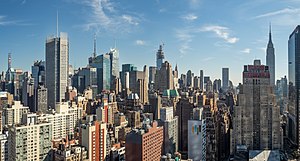Portal:Business
The Business and Economics Portal Business is the practice of making one's living or making money by producing or buying and selling products (such as goods and services). It is also "any activity or enterprise entered into for profit." A business entity is not necessarily separate from the owner and the creditors can hold the owner liable for debts the business has acquired. The taxation system for businesses is different from that of the corporates. A business structure does not allow for corporate tax rates. The proprietor is personally taxed on all income from the business. A distinction is made in law and public offices between the term business and a company such as a corporation or cooperative. Colloquially, the terms are used interchangeably. (Full article...) Economics (/ˌɛkəˈnɒmɪks, ˌiːkə-/) is a social science that studies the production, distribution, and consumption of goods and services. Economics focuses on the behaviour and interactions of economic agents and how economies work. Microeconomics analyses what is viewed as basic elements in the economy, including individual agents and markets, their interactions, and the outcomes of interactions. Individual agents may include, for example, households, firms, buyers, and sellers. Macroeconomics analyses the economy as a system where production, distribution, consumption, savings, and investment expenditure interact, and factors affecting it: factors of production, such as labour, capital, land, and enterprise, inflation, economic growth, and public policies that have impact on these elements. (Full article...) Selected articleThe Doha Development Round is the current trade-negotiation round of the World Trade Organization (WTO) which commenced at Doha, Qatar in November 2001. Its objective is to lower trade barriers around the world, permitting free trade between countries of varying prosperity. As of 2008, talks have stalled over a divide on major issues, such as agriculture, industrial tariffs and non-tariff barriers, services, and trade remedies.The most significant differences are between developed nations led by the European Union (EU), the United States (USA) and Japan and the major developing countries led and represented mainly by India, Brazil, China and South Africa. There is also considerable contention against and between the EU and the USA over their maintenance of agricultural subsidies—seen to operate effectively as trade barriers. The Doha Round began with a ministerial-level meeting in Doha, Qatar in 2001. Subsequent ministerial meetings took place in Cancún, Mexico (2003), and Hong Kong (2005). Related negotiations took place in Geneva, Switzerland (2004, 2006, 2008); Paris, France (2005); and Potsdam, Germany (2007). The most recent round of negotiations, July 23-29 2008, broke down after failing to reach a compromise on agricultural import rules. Selected image
Selected economy The economy of New York City encompasses the largest municipal and regional economy in the United States. In 2022, the New York metropolitan area generated a gross metropolitan product (GMP) of US$1.4trillion, with a population of 23.6 million people. Anchored by Wall Street in Lower Manhattan, New York City has been characterized as the world's premier financial center. The city is home to the New York Stock Exchange (NYSE, on Wall Street) and Nasdaq (headquartered in Times Square), the world's two largest stock exchanges by both market capitalization and trading activity. New York City, anchored by Manhattan, is the world's leading center of banking, finance, and communication. Many of the world's largest corporations are headquartered in Manhattan. The borough contained over 500 million square feet (46.5 million m2) of office space in 2015, making it the largest office market in the United States. Midtown Manhattan, with nearly 400 million square feet (37.2 million m2) that same year, is the largest central business district in the world. New York City is distinctive for its high concentrations of advanced service sector firms in the law, accountancy, banking, and management consultancy fields. It is the top global center for the advertising industry, which is metonymously called "Madison Avenue". Silicon Alley, metonymous for New York's broad-spectrum high technology sphere, continues to expand. (Full article...) Selected quote" Until the latest of our world conflicts, the United States had no armaments industry. American makers of plowshares could, with time and as required, make swords as well. But now we can no longer risk emergency improvisation of national defense; we have been compelled to create a permanent armaments industry of vast proportions. Added to this, three and a half million men and women are directly engaged in the defense establishment. We annually spend on military security more than the net income of all United States corporations. This conjunction of an immense military establishment and a large arms industry is new in the American experience. The total influence -- economic, political, even spiritual -- is felt in every city, every State house, every office of the Federal government. We recognize the imperative need for this development. Yet we must not fail to comprehend its grave implications. Our toil, resources and livelihood are all involved; so is the very structure of our society. In the councils of government, we must guard against the acquisition of unwarranted influence, whether sought or unsought, by the military industrial complex. The potential for the disastrous rise of misplaced power exists and will persist. We must never let the weight of this combination endanger our liberties or democratic processes. We should take nothing for granted. Only an alert and knowledgeable citizenry can compel the proper meshing of the huge industrial and military machinery of defense with our peaceful methods and goals, so that security and liberty may prosper together Akin to, and largely responsible for the sweeping changes in our industrial-military posture, has been the technological revolution during recent decades. In this revolution, research has become central; it also becomes more formalized, complex, and costly. A steadily increasing share is conducted for, by, or at the direction of, the Federal government."
TopicsRelated WikiProjectsDid you know (auto-generated) -
On this day in business history
General imagesThe following are images from various business-related articles on Wikipedia.
More did you know
Business news Wikinews Economy and business portal
|






































